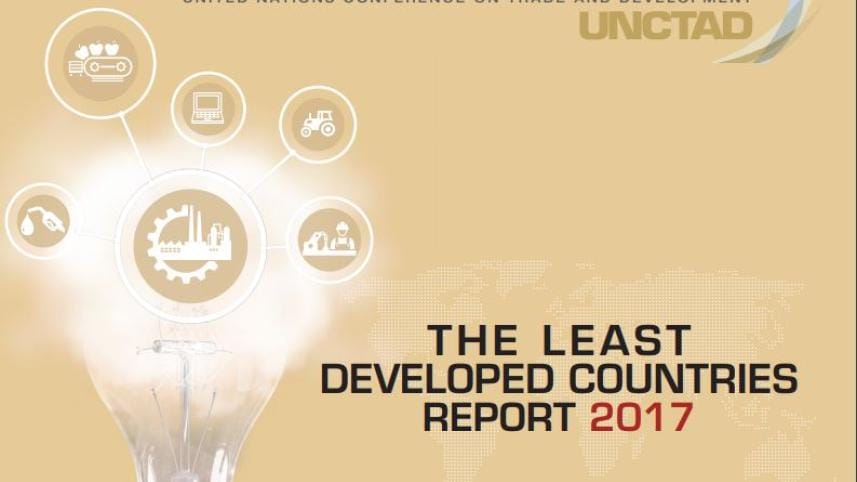Bangladesh among top 5 LDCs in growth: Unctad

The United Nations Conference on Trade and Development (Unctad) has said only five countries, including Bangladesh of the 45 least developed countries (LDCs), achieved economic growth at 7 percent or higher in 2017.
The four other countries are Djibouti (+7pc), Ethiopia (+8.5pc), Myanmar (+7.2pc), and Nepal (+7.5pc) while Bangladesh achieved +7.1pc growth in 2017.
The analysis contends that too many LDCs remain dependent on primary commodity exports.
All other LDCs recorded current account deficits of varying sizes, ranging from less than one percentage point of GDP - Bangladesh and Nepal - to more than 25 percent in the cases of Bhutan, Guinea, Liberia, Mozambique, and Tuvalu.
Resources sent by individuals to LDCs as a group (remittances) totalled $36.9 billion in 2017, down by 2.6 percent compared to the peak of $37.9 billion in 2016.
In absolute terms, the largest recipients of remittances among LDCs included Bangladesh ($13.6 billion in 2016), Nepal ($6.6 billion), Yemen ($3.4 billion), Haiti ($2.4 billion), Senegal ($2 billion) and Uganda ($1 billion), according to Unctad.
Economic development in the world's most-disadvantaged countries - mostly in sub-Saharan Africa - is stalling against the background of a lukewarm global recovery, risking widening inequality, new analysis from Unctad has revealed.
Data suggests that the 47 least developed countries (LDCs), a long-established category of nations requiring special attention from the international community, will fall short of goals set out in the 2030 Agenda for Sustainable Development unless urgent action is taken.
"The international community should strengthen its support to LDCs in line with the commitment to leave no one behind," Paul Akiwumi, Director of Unctad's Division for Africa, Least Developed Countries and Special Programmes, said.
"With the global economic recovery remaining tepid, development partners face constraints in extending support to LDCs to help them meet the Sustainable Development Goals."
GDP growth rates will likely continue to fall short not only of their 2002-2008 average, but also of their 2010-2014 levels, Akiwumi said.
The analysis highlights that LDC growth averaged just 5 percent in 2017 and will reach 5.4 percent in 2018 - below the target of 7 percent growth envisaged by target 1 of Sustainable Development Goal 8 on promoting sustained, inclusive and sustainable economic growth.
While international prices for most primary commodity categories have trended upwards since late 2016, this modest recovery barely made a dent to the significant drop experienced since 2011, particularly in the cases of crude petroleum and minerals, ores and metals.
In 2017, the LDCs as a group were projected to register a current account deficit of $50 billion, the second-highest deficit posted so far, at least in nominal terms.
This stands in contrast to figures for other developing countries (not LDCs), all developing countries taken together and developed countries, all of which, as groups, registered current account surpluses.
Projections for 2018 suggest that the current account deficits of the LDCs are expected to grow further, making worse possible balance-of-payments weaknesses.
Only a handful of LDCs, according to estimates by the International Monetary Fund, recorded current account surpluses in 2017, including two recipients of relatively large amounts of aid - Afghanistan and South Sudan - as well as Eritrea and Guinea Bissau.
Special foreign aid commitments for LDCs amounted to $43.2 billion, representing only an estimated 27 percent of net aid to all developing countries. This suggests a 0.5 percent increase in aid in real terms year-on-year.
This trend supports fears of a levelling-off of aid to LDCs in the wake of the global recession.
"This analysis signals a clarion call for action," said Akiwumi. "The international community needs to pay increased attention to their commitments toward LDCs."
The analysis was presented to Unctad member States at a meeting of its governing body in Geneva, Switzerland, on 5 February.
The LDCs will not achieve the Sustainable Development Goals unless they speed up wholesale restructuring of their economies, said the Unctad.



 For all latest news, follow The Daily Star's Google News channel.
For all latest news, follow The Daily Star's Google News channel.
Comments